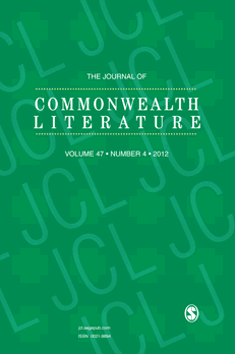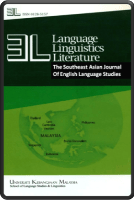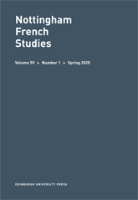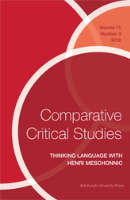
Litera-Journal of Language Literature and Culture Studies
Scope & Guideline
Illuminating the Intersections of Culture and Expression
Introduction
Aims and Scopes
- Interdisciplinary Literary Analysis:
The journal focuses on literary texts from various genres and time periods, employing diverse analytical frameworks including feminist, postcolonial, and ecocritical theories. - Cultural Studies and Contextualization:
It aims to contextualize literature within broader cultural and historical narratives, examining how societal issues influence literary production and reception. - Translation Studies:
The exploration of translation as a critical practice is a significant theme, assessing the impact of translation on cultural exchange and representation. - Gender and Identity Politics:
The journal frequently addresses issues of gender, identity, and representation, particularly how these themes manifest in literature and cultural discourse. - Ecocriticism and Environmental Literature:
Recent publications indicate a growing focus on ecocriticism, exploring how literature engages with ecological themes and environmental issues.
Trending and Emerging
- Ecological Awareness and Literature:
A growing trend towards ecocriticism highlights literature's engagement with ecological themes, reflecting urgent global environmental concerns. - Migration and Exile Narratives:
An increase in studies focusing on migration and exile reflects contemporary societal challenges, emphasizing identity, belonging, and cultural displacement. - Intersectionality in Literary Studies:
There is a rising interest in intersectionality, examining how various identities (gender, race, class) interact within literary texts and cultural narratives. - Digital Humanities and Literature:
Emerging methodologies in digital humanities are influencing literary studies, as scholars utilize digital tools for textual analysis and cultural dissemination. - Anti-Humanism and Posthumanism:
A trend towards exploring anti-humanist and posthumanist perspectives suggests a shift in understanding human agency and identity in literature.
Declining or Waning
- Traditional Literary Canon:
There has been a noticeable decline in analyses focused solely on the traditional literary canon, as the journal increasingly embraces diverse voices and contemporary issues. - Historical Literary Scholarship:
While historical context remains important, there is a waning interest in purely historical literary scholarship without a contemporary lens, as scholars prefer to link past literature to current socio-political contexts. - Strict Genre Studies:
The rigid classification of literature into strict genres is less common, with more emphasis on blending genres and exploring hybrid forms. - Structuralist Approaches:
Structuralist literary theories have seen a decrease in focus, as post-structuralist and deconstructionist approaches gain more traction in contemporary literary studies. - National Literature Focus:
There is a diminishing emphasis on national literature as a standalone category, with increasing interest in transnational and global literary movements.
Similar Journals

JOURNAL OF COMMONWEALTH LITERATURE
Connecting Cultures Through Literary ExplorationJOURNAL OF COMMONWEALTH LITERATURE, published by SAGE Publications Ltd, serves as a premier platform for scholarly discourse in the field of Literature and Literary Theory. Established in 1966, this esteemed journal has built a robust reputation, as evidenced by its impressive Q1 ranking in the 2023 category of Literature and Literary Theory and its placement in the impressive 91st percentile among its peers in the Scopus rankings. With an ISSN of 0021-9894 and an E-ISSN of 1741-6442, the journal provides valuable insights into the rich tapestry of Commonwealth literature, exploring diverse works and critical theories that shape our understanding of literature outside the conventional Western canon. While currently not designated as an Open Access journal, it continues to attract a global readership seeking to advance knowledge in this vital area of scholarship. Researchers, professionals, and students alike will find in its pages a rich resource for innovative ideas and critical discussions that reflect the evolving landscape of literary studies.

Impossibilia-Revista Internacional de Estudios Literarios
Connecting Cultures Through the Power of WordsImpossibilia-Revista Internacional de Estudios Literarios is a premier open access journal dedicated to the vibrant field of literary studies, published by ASSOC CULTURAL IMPOSSIBILIA since 2011. With its ISSN 2174-2464, this international journal encourages the exploration and analysis of diverse literary theories, texts, and contexts, making it an essential resource for researchers, scholars, and students alike. Hailing from Granada, Spain, Impossibilia not only fosters academic discourse in literature but also promotes intercultural dialogue through its commitment to accessibility and inclusivity. While data such as H-index and Scopus rankings are still to be developed, the journal's focus on enriching the literary landscape ensures its growing impact and relevance within the academic community.

Romanic Review
Cultivating Academic Conversations Across Languages and LiteraturesThe Romanic Review, published by Duke University Press, stands as a significant scholarly platform in the field of Romance languages and literature. With its ISSN 0035-8118 and E-ISSN 2688-5220, this journal has been serving the academic community since its inception and will continue its contribution until 2024. Situated in the United States, it has carved out a vital niche in the Arts and Humanities, currently falling within the Q3 quartile as per the 2023 rankings. Although it operates under a traditional subscription model, its focus on disseminating critical and innovative research makes it an indispensable resource for scholars and students alike. The Romanic Review is dedicated to fostering academic discussions that bridge interdisciplinary gaps, making it a cornerstone reference for anyone engaged in the study of Romance cultures, linguistics, and literary studies.

Literary Voice
Innovating Scholarship in the HumanitiesLiterary Voice is a pioneering journal dedicated to the exploration and critique of literature and its multifaceted dimensions. Established in Punjab, India, and published by LITERARY VOICE, this journal aims to serve as a vital platform for scholars, researchers, and enthusiasts in the field of literary studies. With its ISSN 2277-4521 and E-ISSN 2583-8199, Literary Voice strives to foster intellectual discourse and encourage innovative scholarship through diverse thematic issues. While currently operating without an open access model, the journal provides a crucial space for the dissemination of original research and critical analysis that contribute to the enrichment of literary understanding. As an emerging publication in the humanities, Literary Voice invites submissions from across the globe, making it an essential resource for those looking to engage with contemporary literary debates and foster cross-cultural dialogues.

3L-Language Linguistics Literature-The Southeast Asian Journal of English Language Studies
Navigating Contemporary Issues in Southeast Asian Language Studies3L-Language Linguistics Literature - The Southeast Asian Journal of English Language Studies is a prestigious academic journal published by Penerbit Universiti Kebangsaan Malaysia, showcasing the dynamic field of linguistics, language studies, and literature. With an open access policy since 2006, this journal aims to disseminate high-quality research and critical analyses, catering to an international audience of researchers, academics, and practitioners. The journal has achieved impressive rankings, positioning it in the Q2 category for Linguistics and Language, and Q1 for Literature and Literary Theory in 2023, reflecting its significant impact in these fields as evidenced by a remarkable Scopus ranking of #27/1106 in Literature and Literary Theory, placing it in the 97th percentile. This makes 3L an essential resource for those seeking to engage with contemporary issues and innovations within the Southeast Asian context and beyond. With a commitment to advancing knowledge in language and literature, 3L fosters a vibrant scholarly community dedicated to excellence in research.

NEOPHILOLOGUS
Transforming Understanding of Linguistic and Literary PhenomenaNEOPHILOLOGUS, published by Springer, stands as a pivotal journal in the fields of Linguistics and Language as well as Literature and Literary Theory. With an illustrious history dating back to 1916 and continuing through various phases until 2024, this journal has entrenched itself as a crucial platform for scholarly discussion and research dissemination. NEOPHILOLOGUS is recognized for its high academic standards, as evidenced by its impressive category quartiles, ranking in the Q2 tier for Linguistics and Language and Q1 for Literature and Literary Theory as of 2023. Notably, it ranks in the 81st percentile for Arts and Humanities in the Scopus database, underscoring its significant contribution to the humanities discourse. While the journal does not currently offer open access options, it remains a valuable resource for researchers, professionals, and students seeking in-depth analyses and insights within its specialized domains. Based in Dordrecht, Netherlands, NEOPHILOLOGUS invites contributions that advance our understanding of linguistic and literary phenomena, ensuring its relevance and impact in these dynamic fields.

Balkanistic Forum
Bridging Perspectives in Balkan Anthropology and LiteratureBalkanistic Forum, published by Univ Publishing House Neofit Rilski, is a prominent academic journal dedicated to the interdisciplinary study of the Balkan region, encompassing diverse fields including Anthropology, Cultural Studies, History, Linguistics, and Literature and Literary Theory. Established in 2015 and operating out of Bulgaria, this journal aims to promote scholarly dialogue and research that illuminates the complexities and nuances of Balkan societies and cultures. With a commitment to advancing knowledge, it features peer-reviewed articles that not only enrich academic discourse but also encourage the exploration of historical and contemporary issues pertinent to the Balkan area. The journal is classified within the Q2 and Q3 quartiles in various disciplines as of 2023, attesting to its growing influence and contribution within the academic community. Authors and researchers are encouraged to engage with this open-access platform, providing invaluable insights for professionals, students, and scholars interested in the multifaceted dimensions of Balkan studies.

NOTTINGHAM FRENCH STUDIES
Cultivating Critical Perspectives in French ScholarshipNOTTINGHAM FRENCH STUDIES is a distinguished academic journal published by Edinburgh University Press, focusing on the diverse realms of French language, literature, culture, and history. With its ISSN 0029-4586 and E-ISSN 2047-7236, the journal serves as a vital platform for scholarly discourse, featuring interdisciplinary research that bridges gaps between Cultural Studies, Linguistics, and Literary Theory. Notable for its robust performance, it holds a Q3 ranking in Cultural Studies and Linguistics and a Q2 ranking in Literature and Literary Theory as of 2023, placing it among the key publications within its field. Throughout its publication span from 1996 to 2024, NOTTINGHAM FRENCH STUDIES has consistently catered to the academic community with insightful articles, enriching the understanding of French cultural contexts. While it is not an Open Access journal, its contributions are pivotal in advancing scholarly dialogue and fostering critical perspectives, making it an essential resource for researchers, professionals, and students engaged in French studies and its interdisciplinary connections.

Metacritic Journal for Comparative Studies and Theory
Championing Interdisciplinary Research for a Global Audience.Metacritic Journal for Comparative Studies and Theory is a premier scholarly publication focusing on interdisciplinary research within the fields of Arts and Humanities, as well as Social Sciences. Published by UNIV BABES-BOLYAI, FAC LETTERS, PHANTASMA CTR IMAGINATION STUDIES, this Open Access journal has made significant strides since its inception in 2015, providing a platform for innovative comparative studies that inspire critical discourse. With an impressive Q2 ranking in both Arts and Humanities and Social Sciences, the journal showcases high-quality research that engages contemporary issues and theoretical frameworks. Its Scopus rankings further highlight its impact, with a noteworthy position in the 78th percentile for Arts and Humanities and 40th percentile for Social Sciences. As an accessible resource for researchers, professionals, and students, the journal encourages contributions that navigate complex themes of interpretation and imagination that resonate within and beyond Romanian scholarship. Discover the latest insights and foster collaborations in a dynamic academic landscape.

Comparative Critical Studies
Bridging Cultures through Scholarly ExplorationComparative Critical Studies, published by Edinburgh University Press, is a distinguished journal that serves as a vital platform for scholarly discourse in the fields of Cultural Studies and Literature and Literary Theory. Since its inception in 2004, this peer-reviewed journal has garnered significant recognition, achieving a Q2 rating in Cultural Studies and a prestigious Q1 rating in Literature and Literary Theory according to the 2023 Category Quartiles. With its focus on comparative analyses and interdisciplinary approaches, the journal engages a wide range of perspectives from contemporary scholarship, exploring the intricacies of cultural and literary phenomena. Researchers, professionals, and students alike will find value in its rich repository of critical insights, contributing to a deeper understanding of the global literary landscape. Although the journal operates on a traditional subscription model, it remains accessible to a broad audience, creating opportunities for innovative dialogues and collaborations in the evolving fields of literary and cultural studies. Located in the heart of Edinburgh, a city renowned for its rich literary heritage, the journal continues to foster an environment of academic excellence and cultural critique.